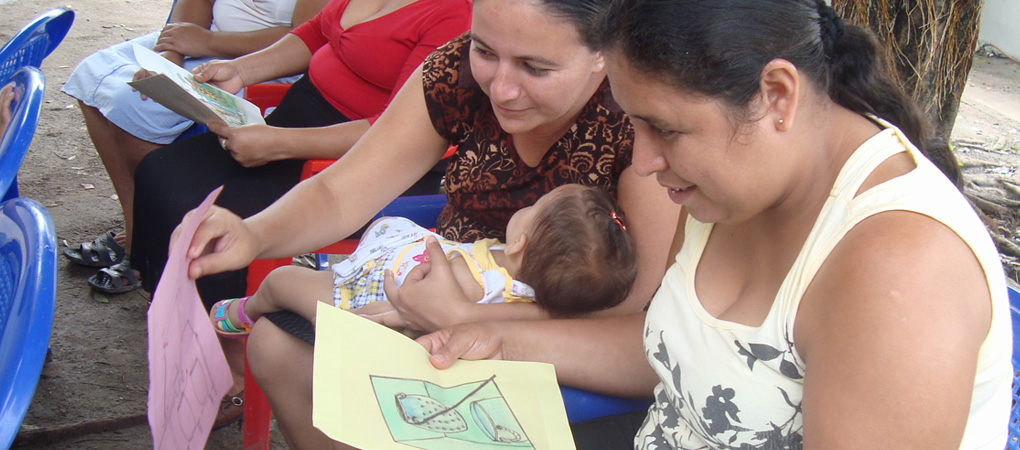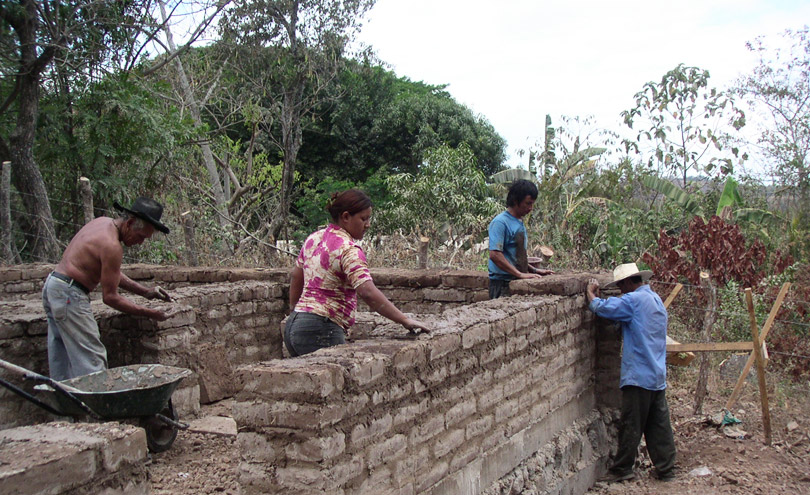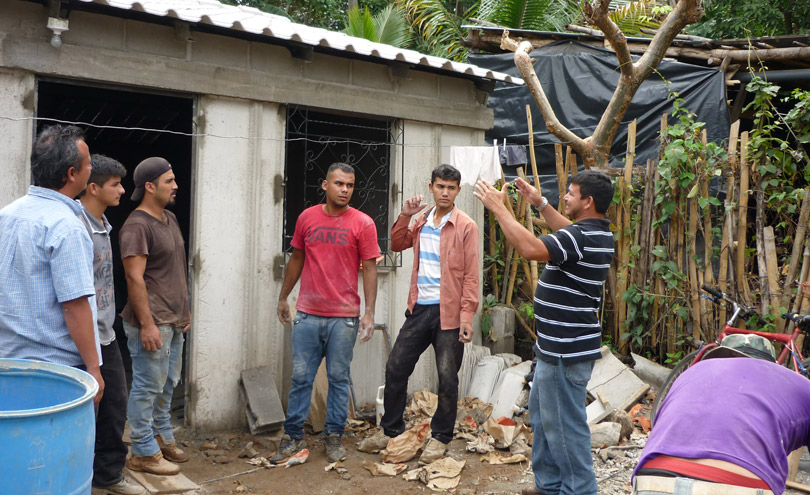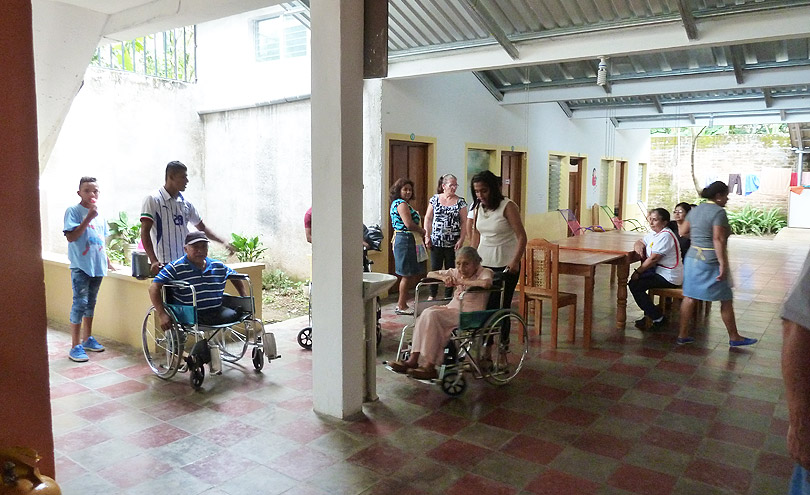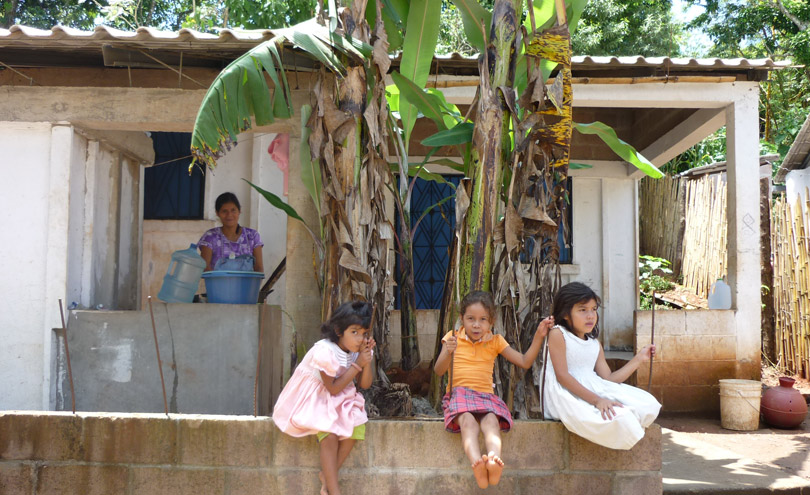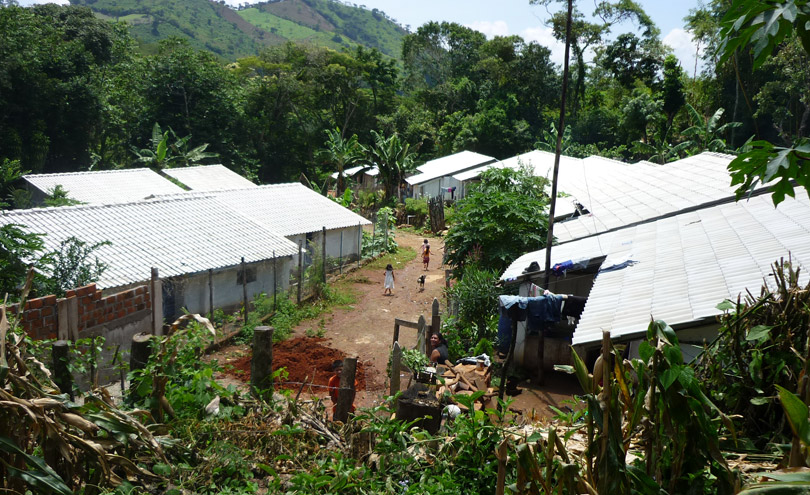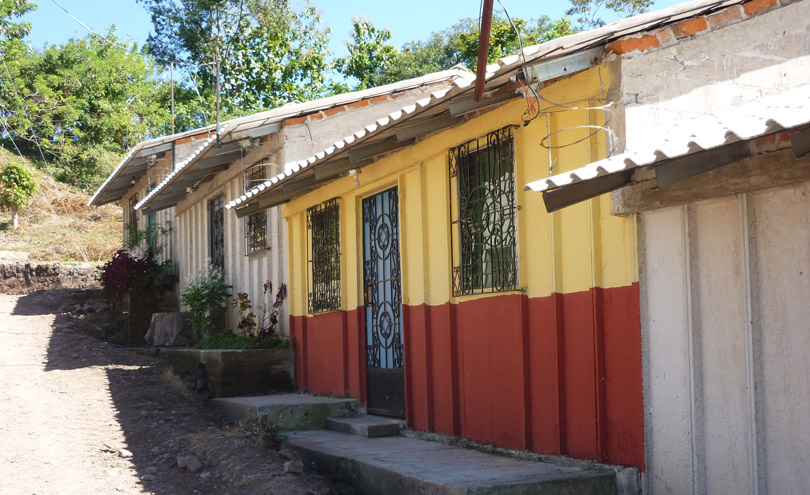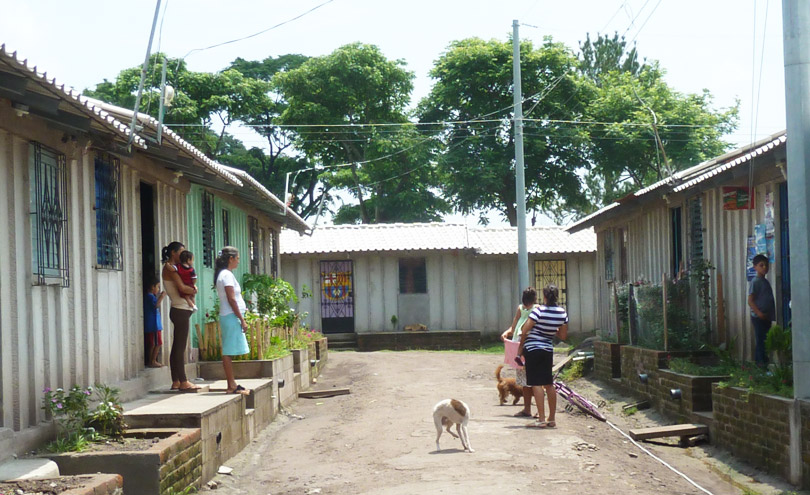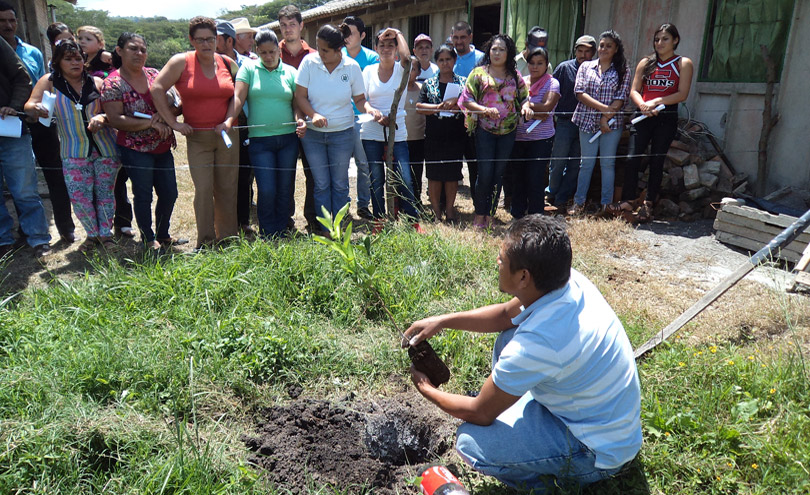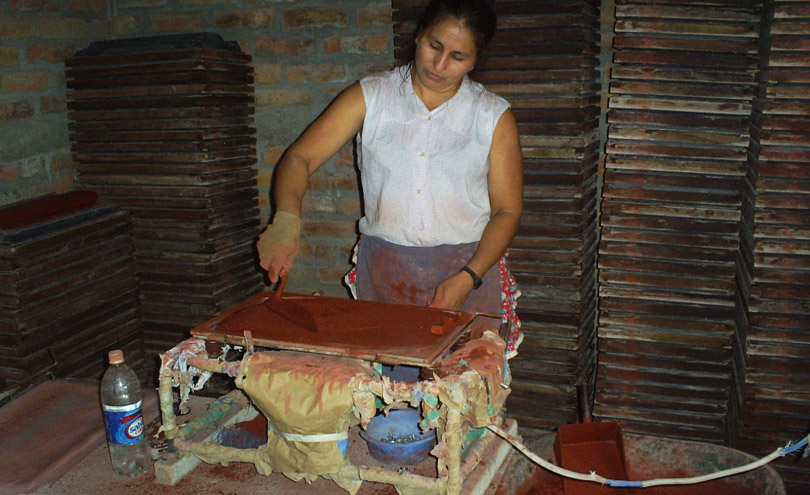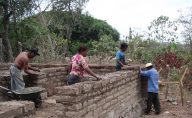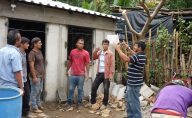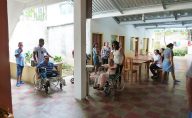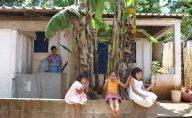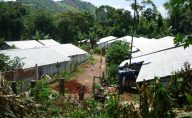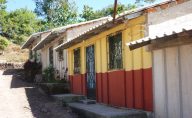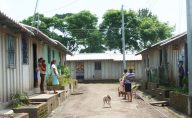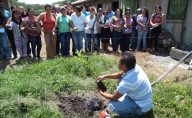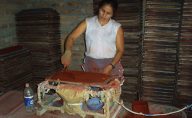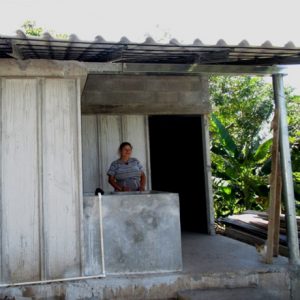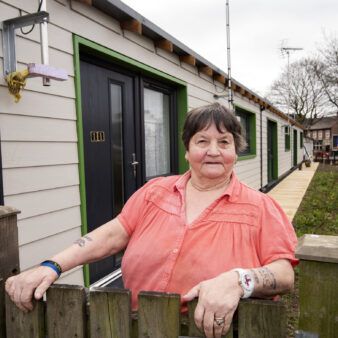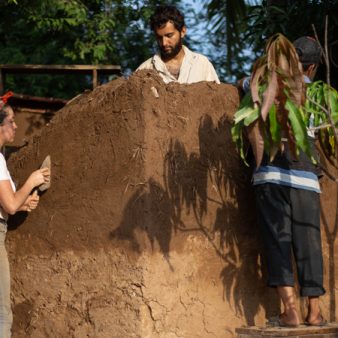Project Description
In 1998, a group of 110 women started ACAMS (Asociación Cooperativa de Ahorro y Crédito Mujeres Solidarias, The Women’s Solidarity Savings and Loans Cooperative). Run by and for women, the cooperative began in the rural town of Tejutepeque in El Salvador. Set up to respond to a succession of problems affecting the community – like poverty, armed conflict and earthquakes – it now has 711 members across three municipalities. Two earthquakes badly affected the region in 2001 and a lack of intervention from the Government led ACAMS to focus their activities on rebuilding homes and strengthening communities.
ACAMS has extended its work beyond Tejutepeque to the neighbouring towns of Cinquera and Jutiapa. The membership of the cooperative is made up of about 10% of the female population of these three towns, which collectively have a total population of about 13,000 people. Many of the women who are members are actively involved the discussions and decision making, which are such an important part of the cooperative.
To achieve their objective of strengthening the community, The Women’s Solidarity Savings and Loans Cooperative:
- Provides credit and raises funds through subsidies for building and improving homes.
- Provides training for local people including residents and builders in safe and environmentally-sustainable building techniques.
- Produces locally-sourced, environmentally-sustainable building materials.
- Provides training for women in household finances, savings and microenterprise management.
- Sets up community facilities such as training centres and nursing homes for older residents.
Since 2011, ACAMS has given out 2,406 loans to local residents. These loans enable local families on low incomes to build or restore their own homes and also support income-generating activities such as agriculture or small businesses.
The work of The Women’s Solidarity Savings and Loans Cooperative receives support from community organisations and EcoSur (a network of organisations concerned with sharing good practice on housing and habitat in the Global South). Financial support is provided by Solidar Suiza, a Swiss non-governmental organisation, and DESWOS, a German non-profit organisation. Although some projects are dependent on external funding, through the use of revolving loans the organisation is able to support the majority of its own core costs. Many families already own a plot to build on. But when this is not the case, the local government of Tejutepeque guarantees access to land by transferring public land to low income households for housing. This transfer happens in progressive stages, with families securing full ownership once they have completed the loan repayment to the cooperative. The local authority also provides financial support for the wider community projects being carried out by the cooperative, via subsidies, for facilities such as the nursing home for older residents.
Aims and Objectives
The main aims of The Women’s Solidarity Savings and Loans Cooperative are to:
- Improve the quality of life for their members and the wider community, especially those who are in poverty.
- Support low-income families into decent housing through education and access to credit.
- Increase the number of homes by building and restoring using environmentally friendly, affordable materials.
- Turn around an area which has suffered from natural disasters and civil war.
Specific objectives include:
- Involve families in improving their homes and communities.
- Train builders to construct safe, secure housing.
- Offer loans with lower interest than market rates to create a sustainable mortgage system.
- Provide financial education and planning as a condition of obtaining credit.
- Produce environmentally-sustainable, affordable and practical building materials.
- Encourage gender equality through supporting empowerment of women in a remote area with few alternative opportunities.
Long term aims include:
- To extend the cooperative’s membership and services across El Salvador. Still women-led and focused on transparency and democracy and keeping the headquarters in Tejutepeque.
- To become a leading organisation in construction and finance in El Salvador.
Context
In 1998, after the peace agreements that ended the 12-year civil war in El Salvador, 110 women in the rural town of Tejutepeque decided to start a savings and loans cooperative. ACAMS (The Women’s Solidarity Savings and Loans Cooperative) was set up with little external support, to recognise and respond to the needs of local women. Cooperatives run by women for women are rare in Latin America – although inclusive in principal of gender equality, they tend to be dominated by men in practice.
In 2001, when they were halfway through the process of formally becoming a cooperative, El Salvador was hit by two strong earthquakes. A large number of the (roughly) 1,700 homes in Tejutepeque were destroyed or damaged. Without a sufficiently coherent housing policy from the national government, many families had to adopt short-term measures for shelter. These were temporary structures using unsuitable materials, often built by people with little training. Much of the population still lives in homes that are inadequate for their needs. More than half are in poor condition, or too small for the size of the families who live in them.
The Women’s Solidarity Savings and Loans Cooperative led the relief efforts after the earthquakes and saw the need to do something about the condition of homes in the area.
To try to improve the situation for their community, ACAMS (the women’s cooperative) support the construction and renovation of safer, more secure housing, and involve the residents themselves in building their own homes. Some households are exempt from construction if they lack the capacity to carry this out – for example, in the case of elderly people without family, or widows with young children. In this case, either the project or the municipality cover the labour needs. They set up a local factory to produce construction materials with the help of Solidar Suiza (a Swiss non-governmental organisation) and the EcoSur network. Their work has developed more widely to support the recovery of their neighbourhoods and communities.
Key Features
ACAMS has achieved impressive growth. Started by a group of 110 women it has now attracted 711 members, 10% of the female population of Tejutepeque and its neighbouring towns of Jutiapa and Cinquera.
The Women’s Solidarity Cooperative focuses on savings, educating families in personal finance, providing people with mortgages for housing, and loans which are used for businesses, livestock, agriculture and agroforestry. ACAMS is run by women, who are often excluded from positions of power and decision-making in El Salvador. The all-female board of directors plans and manages projects with support from EcoSur on specific aspects of construction. The board of directors discusses and identifies activities which will benefit their communities, and ensures the views of both women and men are taken into account. This process has led to new projects like the construction and management of a nursing home, community centre and training centre.
Housing is constructed by young people who have taken part in a formal training scheme. This programme includes practical training, lasts 18 months, and closes with examinations and receiving a diploma. The youths are trained in groups of ten (so far only men have participated). Most of them come from families that have benefitted from the housing programme.
These young apprentices are in charge of carrying out the skilled tasks in housing construction, under the supervision of an instructor. The individual cooperative members benefiting from the housing programme will join in the construction process through sweat equity. They do this with the support of at least one helper to support them in the process (family member or paid labourer).
EcoSur provides advice and support through knowledge exchange with its partner Sofonias Nicaragua. In particular they help to monitor the construction projects and provide technical assistance from architects and engineers.
What impact has it had?
The Women’s Solidarity Savings and Loans Cooperative (ACAMS) has helped to educate and inspire women across the area to take decisions, support their families and make a difference in their communities.
Since 2006, ACAMS members have built 214 homes and provided more than 630 families with access to credit to carry out repairs. A further 60 homes are currently under construction, and it is hoped more funding will be secured in 2019. New families have started to come to ACAMS with their own finances, to ask for support with the design and construction of their homes.
ACAMS plays an important role in developing communities as well as improving housing. There are several active groups that support the wider community in areas like learning in the community, gender equality, household finances and health. The community in Tejutepeque recognised the need to provide better support for elderly people, which had for example had been asking for a nursing home for several years. This was finally built with the support of local government. The participation of women has helped recognise and tackle issues that affect women in particular, such as ensuring privacy in bathrooms.
By providing credit and encouraging saving, the cooperative reaches the poorest families using subsidies from foreign aid. One-to-one support is given to families to help them avoid entering into unmanageable debt agreements with other credit suppliers. They are also supported to understand the risks of borrowing and how to budget based on their income and expenditure, taking a proactive, preventative approach to managing debt.
How is it funded?
The Women’s Solidarity Savings and Loans Cooperative (ACAMS) provides savings and credit services and its lending activities are supervised by the state. The ACAMS mortgage fund is financed through the interest it charges on its loans. The cooperative’s other activities (training and community support) are funded separately. DESWOS funding contributes around 15% (around €23,000 (US$25,991) a year to core costs, including staff.
A factory which produces environmentally-sustainable building materials and a water treatment facility set up to serve the community also generate an income. These two enterprises have helped to fund community projects like the community centre, nursing home and training school. The income also helps ACAMS’s wider activities, like promoting environmentally-sustainable activities.
- Solidar Suiza:
- Initial US$2,400 to legally register as a cooperative.
- US$20,000 for the production of materials.
- DESWOS (Deutsche Entwicklungshilfe für soziales Wohnungs- und Siedlungswesen, German Development Aid for Social Housing and Housing):
- €1.5 million euros (US$1,675,125) for the construction of 186 homes (since 2007).
- €100,000 (US$111,675) for the construction of the community centre and nursing home.
- Stadt Zürich: €100,000 (US$111,675) for the renovation of 80 homes.
- DESWOS and local government: €60,000 (US$67,005) for the construction of the training school.
The cost of ACAMS housing to families is approximately US$150 per square metre, compared to around US$200-250 at market rate. (This refers to the construction costs: materials, transport and labour).
Why is it innovative?
There are very few women’s co-operatives in Latin America, particularly in remote areas. Despite this, The Women’s Solidarity Savings and Loans Cooperative set up with little external support. They saw cooperatives as a male dominated field and encouraged other women to get involved. Their approach to restoring and strengthening their communities is based on democracy and transparency. This is particularly important in rebuilding trust in communities which were divided and traumatised by a 12-year civil war. The participatory nature of the cooperative, particularly amongst women, is innovative in a society which has little background in seeking inclusive solutions.
ACAMS researched environmentally-sustainable construction and set up a way of producing materials locally for themselves. Two of the building materials they produce (roof tiles and flooring panels) were introduced to El Salvador through their relationship with the EcoSur network.
Their savings and credit scheme has become a strong focal point of the community. It guarantees ongoing communication between members and the management team. Daily contact occurs when women deposit their savings or apply for credit. Social and educational programmes provide advice and training on personal finances and household finances.
What is the environmental impact?
The Women’s Solidarity Savings and Loans Cooperative (ACAMS) has a small factory which produces micro-concrete tiles[1] (for roofs), ferrocement panels[2] (for flooring), and concrete blocks. The tiles and panels are durable and have substantially lower embodied energy[3] than more commonly used materials. These two materials were introduced to El Salvador through the relationship of ACAMS with the EcoSur network. As they are made locally this makes the building process less harmful for the environment. Building locally means the price is lower. The products are sold to the general public.
The EcoSur network and the University of Zürich carried out a study of the ACAMS approach to producing construction materials. The study showed that their approach reduces the consumption of cement, steel and sand compared to traditional techniques.
In the countryside, adobe walls of earth and organic materials are built where the land is suitable and materials are available. All of the construction work undertaken by the community meets national government building standards, which offer good resilience to earthquakes. After homes were damaged by the earthquakes in 2001, much of the work to rebuild them was poorly carried out, affecting the trust of communities in construction methods. The work that the cooperative has done has helped to restore confidence.
The Women’s Solidarity Cooperative works with local government to raise awareness of how everyone can protect the environment. Changes to local regulations have helped lead to changes in behaviour, such as separating rubbish for recycling and not burning waste. This relationship has also led to several tree planting days and has improved the protection of replanted areas.
[1] These tiles are made out of cement and sand with low-tech equipment. They are 10 mm thick, and are placed on top of a wooden or metal-based roof structure. These tiles are very resilient to earthquakes and hurricaines (http://www.ecosur.org/index.php/ecomateriales/teja-de-microconcreto)
[2] Ferrocement or ferro-cement is reinforced mortar or plaster (lime or cement, sand and water) applied over a layer of metal mesh, woven expanded-metal or metal-fibres and closely spaced thin steel rods. It is used to construct relatively thin, hard, strong surfaces (https://en.wikipedia.org/wiki/Ferrocement)
[3] Embodied energy is the energy consumed by all of the processes associated with the production of a building, from the mining and processing of natural resources to manufacturing, transport and product delivery
Is it financially sustainable?
The savings and credit activities of the cooperative are financially stable as they use the interest received on mortgage payments. This is the most important activity for ACAMS, which plans to continue offering loans and advice on repairing and restoring homes to support itself in the future. Several commercial activities run by the cooperative contribute to its income, including a water treatment plant and the ACAMS factory which produces and sells building materials. These facilities employ six people.
The construction of new homes is funded entirely by DESWOS (Deutsche Entwicklungshilfe für soziales Wohnungs- und Siedlungswesen, German Development Aid for Social Housing and Housing). They are currently (in 2017) providing funding for 60 new homes in Barrio Santa Rita, and work is underway to attract funding for a similar project in Cinquera in 2019.
The training programme in house building is dependent on external finance. Due to its success so far, it has secured further funding from DESWOS. The mortgage fund is financed by repayments from the families, which amount to approximately US$50,000 per year. This allows ACAMS to fund around 15 mortgages per year independently and additional external funding has allowed more people to rebuild their homes.
The Women’s Solidarity Savings and Loans Cooperative promotes savings and supports residents to be financially responsible. Families are expected to agree a budget before they can qualify for a housing loan. Loans are partially subsidised (generally around 50%) to make them affordable, and the organisation reports very few problems with recovering loan repayments.
Training courses to support women in business and personal development are funded by ACAMS through their own income generating activities and with continued help from Solidar Suiza.
What is the social impact?
The cooperative has a strong commitment to the community and actively promotes inclusion. The committee of members includes people from all sectors of society, including the leaders of both political parties and several churches. This also led to a committee being set up to represent older people. This collaboration was an important aspect in the development of the nursing home and in ensuring it would be maintained.
ACAMS prioritise education as a means of improving lives and empowering women to be in charge of their own situation. They are expected to make financial decisions and to lead family discussions about getting involved in construction. Many of the cooperative’s loans support women to set up small businesses, so training provided on topics like economics and managing micro-enterprises complements this. The cooperative also holds classes in herbal medicine, food and nutrition, reproductive and sexual health, and health and hygiene. Through these activities cooperative members have noted a change in the confidence, pride and capacity of communities.
ACAMS provide training for young people as part of their work to rebuild and restore homes. Each training course provides eight weeks of theoretical classes (taught by an EcoSur instructor), and work experience for 18 months under the supervision of a master builder. The courses accommodate ten young people at a time. ACAMS training courses are promoted and supported by the Ministry of Education in El Salvador which built a training centre and provides materials for students.
Improving sanitation is important to the project, requiring bathrooms to be included in the design of homes. This guarantees hygiene and privacy, taking into account the differing needs of men and women. One community developed a facility which combines a toilet, shower and laundry using rainwater from the roof. This idea has been transferred to other communities working with the cooperative.
Barriers
The location of the project was an area of conflict during the civil war. In the aftermath people became accustomed to charitable donations and aid programmes. This mind-set needed to change to a culture of families improving their own living conditions through savings and credit schemes.
In a traditionally male-dominated society, women were not typically involved in decision making. The Women’s Solidarity Savings and Loans Cooperative provided inclusive education to promote equality and encourage women to take ownership of this community-based programme.
ACAMS has found that it doesn’t have enough funding to respond to the level of demand for credit. However, the cooperative embraces the ‘small is beautiful’ approach, aiming to support 30 to 40 families each year, and works to remain financially sustainable.
Lessons Learned
- It is easier to solve the problems which arise when the community works together.
- Creating more jobs creates opportunities for families to increase income and improve access to credit.
- The training centre provides training in theory and practice. This combination of approaches has worked very well in supporting the development of skills in the community.
- Women were empowered to become independent and make their own financial decisions through actively participating in income-generating activities.
- Housing is just one aspect of improving ‘habitat’ and education is vital to raise awareness.
- Training staff is important in making a strong and effective organisation.
- Each family requires individual attention depending on their needs and the problems they face.
Evaluation
An independent auditor evaluates the project twice a year to monitor the distribution of funds. Annual visits from donors and the EcoSur network includes regular monitoring by specialists.
The Women’s Solidarity Savings and Loans Cooperative has carried out impact assessments of the cooperative and has published a study on the ‘Municipal Policy for Gender Equity’.
An in-depth evaluation is due to be conducted in 2018. This will consider the impact of the project on three levels: personal, community and national. Cooperative members will take part and an external expert will analyse and publish the results. This evaluation will be used as a learning tool for the ACAMS management team and members of the cooperative.
Recognition
There have been several visits from other EcoSur network members from Ecuador, Nicaragua, Cuba, Honduras and Germany. ACAMS have also hosted visits from European Union representatives, UN-Habitat and several donors.
The project has been featured in EcoSur’s e-magazine and DESWOS publications.
Transfer
Six different groups of women started to develop micro-concrete tiles with support from The Women’s Solidarity Savings and Loans Cooperative and EcoSur. Two of the groups have managed to establish themselves in the market. This is still a real achievement in transfer as the market for building materials is highly competitive and male-dominated.
ACAMS has provided services and support to cooperatives from other areas, including ACOTEJERA in Sonsonate; ACOVENCE in Usulután, and ACEDE in San Vicente.
The Women’s Solidarity Cooperative has presented at international events across Central America, Cuba and Ecuador. Groups of women from Cuba and Nicaragua have visited to investigate the possibility of setting up housing co-operatives based on the savings and credit scheme. The cooperative members believe the different elements of their approach can be easily transferred but the biggest challenge is having the right conditions to bring the community together.
In 2008, ACAMS organised a conference on environmentally-friendly building materials for planners from across Central America. They also regularly participate in meetings at a national level.
The cooperative organised a discussion on the theme ‘WASH’ (Water, Sanitation, Hygiene), specifically to hear the perspectives of women. An outcome from this was the development of a community facility comprising a toilet, shower and laundry. This went on to be promoted more widely by EcoSur and has been replicated in Haiti, Ecuador, Nicaragua and Cuba.

